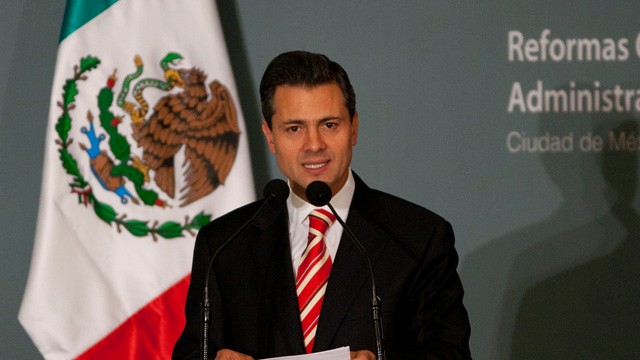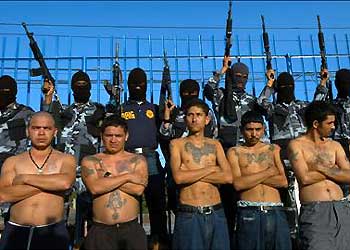COHA’s Exclusive Interview with Former Mexican President Vicente Fox: Agenda of Newly Inaugurated President Enrique Peña Nieto

On July 1 of last year, Enrique Peña Nieto was elected to be the 57th President of Mexico. [1] In an election that saw only 49 million ballots cast out of an electorate of 114 million, Mr. Nieto received approximately 38 percent of the vote. [2] As such, he arguably took office with an unconvincing mandate.
Amongst countless challenges, the new president, who leads the Institutional Revolutionary Party (PRI) has been shouldered with several pressing tasks. Along with boosting a Mexican economy that has been slowed by the rather sour agricultural harvest inflicted by the North American Free Trade Agreement (NAFTA), the new president, Peña Nieto, will be looking to bring peace to the streets of the country. At the same time, he is dealing with a particularly stormy partisan epoch, in which drug cartels have become even more violent, as well as attempting to eliminate poverty by providing new economic opportunities to rank-and-file Mexicans.
In light of this storm of developments, just this week former Mexican President Vicente Fox Quesada furnished COHA with an interview via e-mail in which he discussed the significance of Enrique Peña Nieto’s presidential mandate that took place on December 1, 2012.
Born in Mexico City in 1942, Vicente Fox was elected president in 2000, with his election marking his country’s political history by interrupting the 71-year rule of the PRI. Running on a platform of improving the Mexican economy and hoping to end its reign of political corruption, President Fox’s greatest contribution undoubtedly lies in the newly established societal openness.
The ex-chief executive is now a member of the Madrid club and leads the Fox Center, an institution whose main goal is to boost leadership and entrepreneurism, both considered essential tools for countries that plan on fostering economic advancement. [3]
A Different and Democratic Mexico
The first set of questions in the interview was related to key political issues, which revealed Mr. Fox’s optimism towards the quality of democracy he brought to the country. Even though he admits, “there is certainly a long way to go,” he believes Mexico to be “on the right route.” He claims the country is in a better place today than 12 years ago, referring to the dismal position of the country at the time he took office in 2000. He also paid tribute to the work of his successor, Felipe Calderón, whose term ended when Peña Nieto was sworn in last year.
Fox claims that following his and Calderon’s presidential terms, democracy is now “the most valuable resource on which Mexicans count.” This democratic Mexican society includes, according to him, freedom of speech as a tool to express opinions and thereby create an authentic democratic process. At this juncture, however, it is still difficult to believe that Mexico has finally reached a level of maturity concerning real democratic values.
With regard to the return of the PRI, Mr. Fox does not foresee that “dinosaurs from the past” will come back. He does not believe that an authoritarian PRI will return with Peña Nieto’s presidency. “It would be the same as if the new last generation of priistas threw everything out that they had won in the party’s comeback,” Fox wrote.
In corroborating with the prediction of a less authoritarian PRI, Mr. Fox points to the Pact for Mexico as a political agreement of great importance, in which the three major Mexican political parties are working together to implement necessary reforms. He negates any interpretation of the pact that suggests that the agreement will be any kind of threat to democracy. Bolstered by a blend of wishful thinking and a genuine belief in the Pact, Mr. Fox also disagrees with those who believe that such cooperation could lead to a politically conservative coalition in congress that would be capable of allowing the president to approve potential authoritarian measures.
The Mexican Economic Equation
Today, all economic issues in Mexico present as sensitive subjects, due mainly to the debate arising from NAFTA. Signed in 1994, NAFTA was the grand finale of a critical phase in Mexican history marked by the contentious issue of seeking economic openness for the country. The central goal of the Mexican government was to protect and stabilize the economy, which had struggled mightily since 1982 in the face of fearfully high levels of debt, simmering inflation, and attacks against the country’s currency.
The agreement, said to provide various benefits for Mexico’s neighbors, has arguably made the country extremely dependable on the giant to the north, and thus more vulnerable to international economic cycles as viewed against the inherent strength of the U.S. The country seems to be unable to reach high levels of development, having produced in the past decade lower economic growth than the Latin American (including the Caribbean) average. [4]
In this respect, Mr. Fox argues that Mexico needs to “revive NAFTA and strengthen its commerce with the U.S. and Canada.” In parallel, he urges the country to “take advantage of its relations with the European Union, strengthen its commerce with China and build an alliance with India;” countries that are poised to become global forces by 2050, he wrote.
The former Mexican president also highlighted the importance of “catching up with the countries that are going ahead.” This seems to be a matter of contention for Mexico, since the country has lost space to the emerging South American economies, such as Brazil, Colombia, and Peru. In the past 10 years, the economies of these three countries have individually grown more than Mexico. [5]
Mr. Fox summarizes the current Mexican economic challenge to be a necessity and the recognition of this proves to be one of repaired leadership in Latin America. With this in mind, he bets on “greater and better relations with neighbors from the south and from the north of our own continent.”
As a last topic regarding Mexican economy, Mr. Fox responded to the country’s current tax system and defended a wider tax base along with intensified prosecution against tax evasions as opposed to tax hikes. He claimed that, by way of simplifying tax collection, Mexico could take in more revenue without hikes. “This is the recipe,” he optimistically wrote. For a country that has huge domestic problems, such as drug violence and a dearth of well paying jobs, an overhaul of the tax system might seem ambitious. Other states that have long gone without necessary restructuring of their tax code include mighty industrial countries, such as Europe and the United States.

Security
Along with creating new opportunities for economic growth, Mexico’s next challenge is combating illicit drug cartel activities—arguably the primary cause of the high levels of criminality in the country.
President Fox does not seem to be overly worried about Peña Nieto’s new approach to the issue. “Each president has his own ideas and he has more of the right to develop the strategy that he considers to be more convenient to solve the problems,” he writes. Peña Nieto intends to take the army off the streets, a Calderón initiative, and replace it with an urban gendarmerie. This approach was most recently applied in Colombia. Even the elimination of the Secretary of Public Security, created by Mr. Fox himself, did not bother the former Mexican president. Peña Nieto claimed that the duties assigned to the position are still being carried out.
President Fox, for his part, also “insisted on the legalization of drugs as a reasonable way to diminish levels of violence,” mentioning a handful of international institutions and intellectuals concerned about the issue. According to Fox, the positive outcome of legalization of drugs includes amongst other benefits: (1) the decrease of drug consumption; (2) the reduction of cartel revenue; (3) separation of violence and crime from the subject of health; and (4) the capacity to decide and exercise liberties together with assuming responsibility. All in all, the main goal would be to promote economic development and generate opportunities, he wrote.
In light of the recent legalization of marijuana consumption in the U.S., specifically in the states of Washington and Colorado, this initiative might have the chance to pick up steam. Yet, as has been well documented, the cocaine trade, and not the trafficking of marijuana, is mostly responsible for the endemic violence. Legalizing cocaine would be much tougher, while being the necessary component for the plan to which Fox subscribes.
Conclusions
Throughout his responses, Mr. Fox seemed to value the cooperation between people and institutions as essential to reach desired goals. Included amongst this cooperation is the Pact for Mexico, alliances with other countries, and the latest voting slogan “el voto hoy es por México” (the vote today is for Mexico).
When asked what he would do if he were in Peña Nieto’s place today, Vicente Fox signaled one single target: NAFTA. “I would analyze the results of NAFTA, the agreement between Mexico, the U.S. and Canada, 19 years after its initial creation”, he wrote, adding that the agreement needs new ideas and new strategies. The Security and Prosperity Partnership of North America (SPP) would also be revised as well, he insists. By way of doing this, “North America can face globalization through regionalism, in compliance with a more integrated and structured cooperation.”
North American cooperations also deserved a comment with regard to U.S. immigration policy, which is, in Mr. Fox’s opinion, President Barack Obama’s chance to be the Abraham Lincoln of modern times. In this respect, the former Mexican president revealed his hope for an amendment to the U.S. constitution “defending the decision to immigrate as a human right while condemning its criminalization.”
Paula Beatriz Mian, Research Associate at the Council on Hemispheric Affairs
Please accept this article as a free contribution from COHA, but if re-posting, please afford authorial and institutional attribution. Exclusive rights can be negotiated.
For additional news or analysis on Latin America, please go to: LatinNews.com
References
[1] Archibold, Randall C. “For Mexico’s President-elect, A strategic journey.” July 2, 2012. http://www.nytimes.com/2012/07/03/world/americas/pena-nieto-savors-long-plotted-victory-in-mexico.html?pagewanted=all.
[2] Hernández Navarro, Luis. “Peña Nieto’s victory in Mexico is a vote for the old regime.” July 2, 2012. http://www.guardian.co.uk/commentisfree/2012/jul/02/pena-nieto-mexico-old-regime.
[3] “Quines Somos.” Centro Fox. (Guanajuato, México) http://centrofox.org.mx/Quienes-Somos.asp.
[4] “Data: GDP growth (annual %).” The World Bank. (2013) http://data.worldbank.org/indicator/NY.GDP.MKTP.KD.ZG/countries/xj-MX-BR-AR-PE-CO?display=graph
[5] Ibid.

